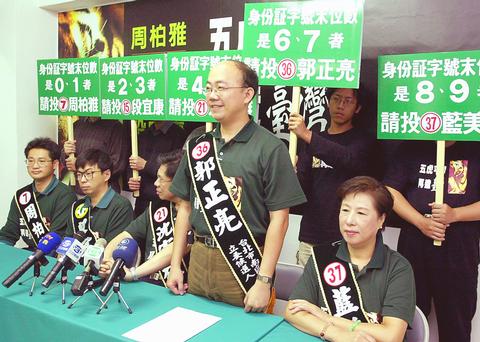Taipei City's two constituencies yesterday became the first areas targeted by the DPP in its drive to achieve an even distribution of votes among its candidates in the Dec. 1 elections. The move comes after the party's secretary-general announced last week that it intended to adopt the strategy across the nation.
The DPP's hope is to maximize the chance of all the party's candidates getting elected. It targets all known party supporters in an area and has proven effective for both the DPP and the New Party in past legislative elections. The DPP's northern district general director Lin Cho-shui (

PHOTO: FANG PIN-CHAO, TAIPEI TIMES
The party estimates that a low voter turnout, combined with an unusually large number of candidates, will make for thin margins in the number of votes received per candidate. It believes that seeking a relatively even distribution of votes will help each of its candidates to receive a specific minimum number of votes.
Vote allocation -- the system used by the DPP -- involves requesting known individual supporters to vote for specific individual candidates.
According to a DPP survey, between 30 and 40 percent of the party's supporters are prepared to vote for the candidate for whom the party instructs them to vote. The party calculates that, given this survey result, each nominated candidate in Taipei's northern district is guaranteed 15,000 votes. It also estimates that a candidate would need to secure 34,000 votes to win election to the legislature.
The party said it will ask supporters to vote for different candidates depending on the supporter's national identity card number.
For instance, voters in Taipei City's northern district whose ID card numbers end in "one" or "two" are asked to vote for Lan Shih-tsung (
"Allocating votes will help to push individual candidates past the margin necessary for election," Lin said.
Julian Kuo (
"Whether the strategy proves effective will depend on whether voters have more faith in party politics than they do in individual candidates, and the degree of cooperation among the party's candidates in each individual constituency," Kuo said.

DAREDEVIL: Honnold said it had always been a dream of his to climb Taipei 101, while a Netflix producer said the skyscraper was ‘a real icon of this country’ US climber Alex Honnold yesterday took on Taiwan’s tallest building, becoming the first person to scale Taipei 101 without a rope, harness or safety net. Hundreds of spectators gathered at the base of the 101-story skyscraper to watch Honnold, 40, embark on his daredevil feat, which was also broadcast live on Netflix. Dressed in a red T-shirt and yellow custom-made climbing shoes, Honnold swiftly moved up the southeast face of the glass and steel building. At one point, he stepped onto a platform midway up to wave down at fans and onlookers who were taking photos. People watching from inside

A Vietnamese migrant worker yesterday won NT$12 million (US$379,627) on a Lunar New Year scratch card in Kaohsiung as part of Taiwan Lottery Co’s (台灣彩券) “NT$12 Million Grand Fortune” (1200萬大吉利) game. The man was the first top-prize winner of the new game launched on Jan. 6 to mark the Lunar New Year. Three Vietnamese migrant workers visited a Taiwan Lottery shop on Xinyue Street in Kaohsiung’s Gangshan District (崗山), a store representative said. The player bought multiple tickets and, after winning nothing, held the final lottery ticket in one hand and rubbed the store’s statue of the Maitreya Buddha’s belly with the other,

‘COMMITTED TO DETERRENCE’: Washington would stand by its allies, but it can only help as much as countries help themselves, Raymond Greene said The US is committed to deterrence in the first island chain, but it should not bear the burden alone, as “freedom is not free,” American Institute in Taiwan Director Raymond Greene said in a speech at the Institute for National Defense and Security Research’s “Strengthening Resilience: Defense as the Engine of Development” seminar in Taipei yesterday. In the speech, titled “Investing Together and a Secure and Prosperous Future,” Greene highlighted the contributions of US President Donald Trump’s administration to Taiwan’s defense efforts, including the establishment of supply chains for drones and autonomous systems, offers of security assistance and the expansion of

STREAMLINED: The dedicated funding would allow the US to transfer equipment to Taiwan when needed and order upgraded replacements for stockpiles, a source said The US House of Representatives on Thursday passed a defense appropriations bill totaling US$838.7 billion, of which US$1 billion is to be allocated to reinforcing security cooperation with Taiwan and US$150 million to replace defense articles provided to the nation. These are part of the Consolidated Appropriation Act, which the US House yesterday passed with 341 votes in favor and 88 against. The act must be passed by the US Senate before Friday next week to avoid another government shutdown. The US House Committee on Appropriations on Monday unveiled the act, saying that it allocates US$1 billion for the Taiwan Security Cooperation Initiative